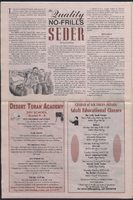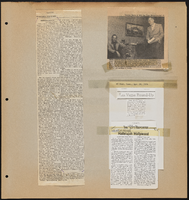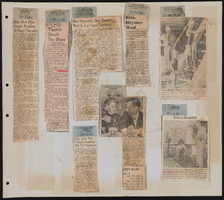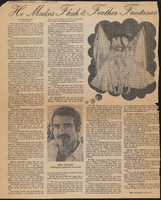Search the Special Collections and Archives Portal
Search Results

Nick Robone oral history interview: transcript
Date
Archival Collection
Description
Oral history interview with Nick Robone conducted by Claytee D. White and Barbara Tabach on December 21, 2017 for the Remembering 1 October Oral History Project. In this interview, Nick Robone, born and raised in Nevada, details his process of healing after being shot during the 2017 Las Vegas mass shooting at the Route 91 Harvest music festival. He discusses the events of that Sunday night and how he has learned to view life in a more positive light. Robone mentions various coping mechanisms that have helped him, including being open about his experience and talking about it with other survivors as well as pursuing his passions.
Text

Transcript of interview with John E. Jeffrey by Frank Vivirito, April 1, 1976
Date
Archival Collection
Description
On April 1, 1976, Frank Vivirito interviewed John E. Jeffrey (born July 20th, 1938, in Sioux City, Iowa) about his life in Southern Nevada. Jeffrey discusses his occupational history and the disparity of work conditions and opportunities for Black and Mexican workers in the Henderson plant. The interview concludes with a brief description of Jeffrey’s family’s medical history.
Text
UNLV University Libraries Collection of Boulder City, Hoover Dam, and Lake Mead National Recreation Area Maps and Brochures
Identifier
Abstract
The UNLV University Libraries Collection of Boulder City, Hoover Dam, and Lake Mead National Recreation Area Maps and Brochures (1927-1998) primarily contains regional maps, brochures for local points of interest, and subdivision plat maps of Boulder City, Lake Mead, and Hoover (Boulder) Dam.
Archival Collection
Edythe and Lloyd Katz Photographs
Identifier
Abstract
The Edythe and Lloyd Katz Photographs (1947-1986) contain photographs of the businesses operated by Las Vegas, Nevada entrepreneurs Edythe and Lloyd Katz. The photographs primarily depict the movie theaters purchased by the Katz Family, including the Guild Theatre (formerly the Palace Theatre) and the Fremont Theatre. The photographs also depict the Katz Family and the Helldorado Days parade.
Archival Collection
Henderson Public Library Photograph Collection on Henderson, Nevada
Identifier
Abstract
The Henderson Public Library Photograph Collection on Henderson, Nevada (approximately 1940-1988) depicts life and growth in Southern Nevada. The collection documents the growth of Henderson, Nevada through images of Basic Magnesium Incorporated, housing throughout the area, and events. The documentation of Basic Magnesium Incorporated, its activites, personnel, and buildings from 1942 through 1944 is prominent in this collection.
Archival Collection
Nevada Mining Photograph Collection
Identifier
Abstract
The Nevada Mining Photograph Collection depicts mining activities, miners, and mining towns in Nevada from 1868 to 1937. The photographs primarily depict the towns of Tonopah, Nevada and Goldfield, Nevada, including mills, buildings, mine shafts, and panoramic views of the landscape. The photographs also depict Beatty, Lost City, Delamar, Candelaria, Winnemucca, Virginia City, Rhyolite, Elko, and Reno, Nevada. The photographs also include portraits of early settlers in Nevada, Native Americans, children, parades, celebrations, and funerals.
Archival Collection




